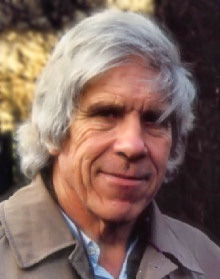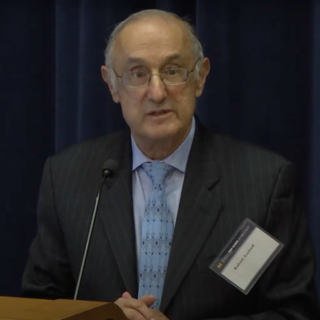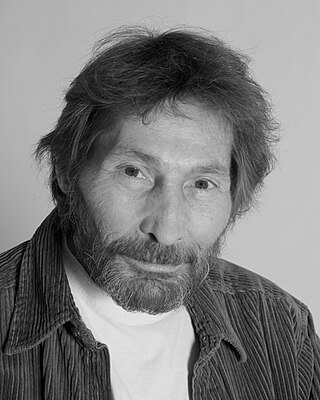
The Evolution of Cooperation is a 1984 book written by political scientist Robert Axelrod that expands upon a paper of the same name written by Axelrod and evolutionary biologist W.D. Hamilton. The article's summary addresses the issue in terms of "cooperation in organisms, whether bacteria or primates".

William Donald Hamilton was a British evolutionary biologist, recognised as one of the most significant evolutionary theorists of the 20th century. Hamilton became known for his theoretical work expounding a rigorous genetic basis for the existence of altruism, an insight that was a key part of the development of the gene-centered view of evolution. He is considered one of the forerunners of sociobiology. Hamilton published important work on sex ratios and the evolution of sex. From 1984 to his death in 2000, he was a Royal Society Research Professor at Oxford University.

Robert Marshall Axelrod is an American political scientist. He is Professor of Political Science and Public Policy at the University of Michigan where he has been since 1974. He is best known for his interdisciplinary work on the evolution of cooperation. His current research interests include complexity theory, international security, and cyber security. His research includes innovative approaches to explaining conflict of interest, the emergence of norms, how game theory is used to study cooperation, and cross-disciplinary studies on evolutionary processes.

Julius Axelrod was an American biochemist. He won a share of the Nobel Prize in Physiology or Medicine in 1970 along with Bernard Katz and Ulf von Euler. The Nobel Committee honored him for his work on the release and reuptake of catecholamine neurotransmitters, a class of chemicals in the brain that include epinephrine, norepinephrine, and, as was later discovered, dopamine. Axelrod also made major contributions to the understanding of the pineal gland and how it is regulated during the sleep-wake cycle.
Robert Watson, Bob Watson, or Bobby Watson may refer to:

David M. Axelrod is an American political consultant, analyst, and former White House official. He is best known for being the chief strategist for Barack Obama's presidential campaigns. After Obama's election, Axelrod was appointed as Senior Advisor to the President. He left the position in early 2011 and became the Senior Strategist for Obama's successful re-election campaign in 2012. Axelrod wrote for the Chicago Tribune, and joined CNN as Senior Political Commentator in 2015. Until recently, Axelrod served as the director of the non-partisan University of Chicago Institute of Politics. His memoir is titled Believer: My Forty Years in Politics.
Axelrod or Akselrod is a surname. Notable people with the surname include:
David Axelrod is an American political consultant.

Robert Axelrod, also credited as Axel Roberts and Myron Mensah, was an American actor. He was primarily known for his voice work, which included Digimon, having started voice acting for the English-language versions of anime in 1980; providing the voice of Lord Zedd, the main villain of the Mighty Morphin Power Rangers; and Finster, the original Mighty Morphin Power Rangers monster maker. He also portrayed a sympathetic doctor, Jennings, in The Blob. He also portrayed a Paul McCartney look-alike on the popular sitcom Family Matters, and later in his career appeared in several productions by comedy duo Tim & Eric.
Robert, Rob, Bob, or Bobby Thomas may refer to:
Mark Webber may refer to:
Ben or Benjamin Smith may refer to:
Robert Bartlett may refer to:

The Holcroft Covenant is a 1985 thriller film based on the 1978 Robert Ludlum novel of the same name. The film stars Michael Caine and was directed by John Frankenheimer. The script was written by Edward Anhalt, George Axelrod, and John Hopkins.
Robert or Bob Dawson may refer to:
Gleb is a Slavic male given name derived from the Old Norse name Guðleifr, which means "heir of god." According to another version, the name Gleb comes from the name Olaf. It is popular in Russia due to an early martyr, Saint Gleb, who is venerated by Eastern Orthodox churches. It is also commonly used in Ukraine and Belarus. Notable people with the name include:
Robert Lane or Bob Lane may refer to:
Robert Stein may refer to:

Billions is an American drama television series created by Brian Koppelman, David Levien, and Andrew Ross Sorkin. The series premiered on January 17, 2016, on Showtime, and its seventh and final season premiered on August 13, 2023.
ARTIS International is a scientific research organization that focuses on behavioral dynamics affecting conflict. Its work is field orientated, and the fellows come from a wide variety of disciplines.
This page is based on this
Wikipedia article Text is available under the
CC BY-SA 4.0 license; additional terms may apply.
Images, videos and audio are available under their respective licenses.







